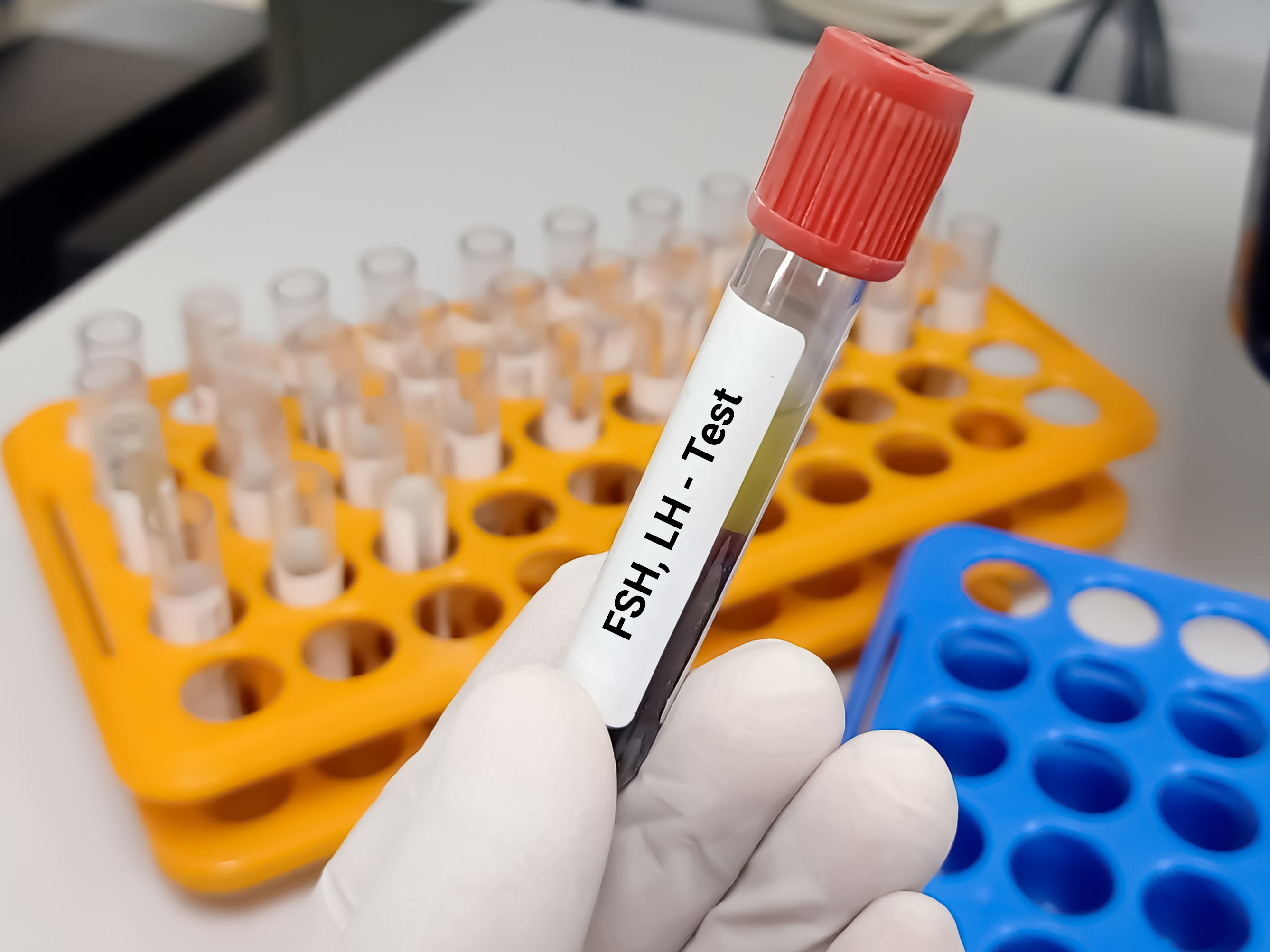When should I take a menopause test?


While often people can determine their menopause status depending on their symptoms, some hormonal tests may help to understand the cause of early or premature menopause.

Menopause is when the ovaries no longer produce eggs, and consequently, the woman no longer remains fertile. The menstrual cycle ceases, and so do the related hormonal fluctuations. Complete menopause is signalized by the appearance of no period for 12 consecutive months. This process is slow and can take years to complete.
Can you test if you are approaching or have achieved menopause? There are some tests which detect the changes in hormonal levels and tell you about menopause. These tests can be beneficial when you are experiencing menopause symptoms.
What types of tests are available, and how do they work? Keep reading to learn more about menopause tests.
Most women can experience all physiological changes related to puberty, periods, menopause etc. Some situations may signal the onset of menopause. You can use these tests to confirm menopause. The common indications for menopause testing are;
For the majority of people, menopause is a function of age. The process can start anytime between 45-55 years of age for most women and will take years (7-14 years) to complete. A small fraction of people (around 1%) will also experience an early onset of menopause naturally before 40, while 0.1% of women have menopause symptoms well before 30.
If you are experiencing the symptoms of perimenopause or menopause, regardless of age, you should go for testing. A correlation of clinical signs with hormone levels will give you a better picture of what's happening inside the body.
Menopause is not an isolated event. Women will experience a prolonged phase of variable length (average length is four years) known as the perimenopause phase. This phase signals the transition from a cyclic stage to a non-cyclic one. This phase is ill-defined, and many women may need help to identify it.
The commonly experienced symptoms are;
Irregular heartbeat
Hot flashes
Disturbed sleeping patterns
Bladder and vaginal problems
Disturbed sexual function
Low sexual desire (libido) and decreased sexual function
Changes in cholesterol levels
Loss of bone strength due to falling oestrogen levels
The presence of these signs means you need menopause testing.

The frequency and intensity of symptoms can vary from person to person. Careful monitoring of these signs and hormone levels can give you a better picture.
Some tests are also available which can detect the perimenopause phase. Our Perimenopause Test is one such test. It detects the levels of various hormones, e.g., oestrogen, progesterone, FSH, and LH, to diagnose the situation. Click here for more information and to place your order.
You inherit the genes that control your sexual and reproductive functions. A review published in the Seminars in Reproductive Medicine noted that around 50% of variations in the age at menopause are due to genetic variations. The epidemiological and biological data suggest that age at puberty, menopause and reproductive performance are interlinked through the same genetic factors involved in DNA maintenance and repair.
It can be beneficial to learn more about your maternal and paternal female relatives. Find out about their age of menopause onset as your onset may also be near the same age. If you are experiencing the symptoms of menopause around that age, a menopause test can help you to confirm.
The standard criteria for declaring menopause is that you don't have any periods for 12 consecutive months.
The other symptoms worth noting are;
Slow metabolism (low energy levels)
Weight gain
Vaginal dryness
Mood swings
Night sweats
Chills
Hair thinning
Dry skin
Unforeseen changes in the breast tissues
These symptoms will last a variable amount of time, and many women report that these symptoms eventually subside after 4-5 years.
Read more: What causes hot flashes apart from menopause?
The post-menopause phase starts when you have missed periods for 12 consecutive months. However, it is not possible that you will reach this stage without knowing. The probability is, however, never zero. During this phase, the menopause symptoms will continue to fade and will disappear within 4-5 years for most women.

The development of postmenopausal syndrome can complicate the matter and prolong the duration of these symptoms. The women in this phase are at an increased risk of heart disease and osteoporosis. The appropriate lifestyle changes in combination with preventive medicines can help reduce the risk. The detection of hormone levels through menopause tests can help you to know if you are in this phase.
Some diseases, e.g., ovarian cancer, cyst and surgical treatment procedures, e.g., ovariohysterectomy (the surgical process involving the removal of the uterus and ovaries) etc., can also cause the early onset of menopause by inducing primary ovarian insufficiency (POI).
Removing the ovary will deprive the body of its hormones, progesterone and oestrogen, resulting in the rapid onset of menopause symptoms. If you have a history of these issues and are experiencing symptoms, you need menopause testing to know if the cause of symptoms is menopause or not.
The menopause hormonal tests will also enable clinicians to initiate hormone replacement therapy (HRT), the most common option for recovering hormonal levels. Restoring the hormone levels will reduce the risk of heart disease, breast cancer and other issues related to oestrogen withdrawal.
The hormonal levels fluctuate throughout the menstrual cycle and become particularly unpredictable during menopause and perimenopause. Therefore, hormonal levels may not be so helpful during these phases. However, despite the issues with their efficacy, the following tests are available to diagnose menopause;
This hormone is produced by the pituitary gland under the influence of the hypothalamus and stimulates the ovaries to produce eggs, which in turn causes more oestrogen production. With advancing age, the ovaries become less functional, particularly near menopause and become less and less responsive to this hormone.
Consequently, the FSH levels in the blood rose while the oestrogen levels fell. FSH testing is the most commonly used test for menopause. It can also tell if the woman is in perimenopause or has already achieved menopause. The FSH levels fluctuate in cyclic women. So, caution should be exercised while interpreting the results. Many tests at specific intervals can provide a better picture.

The commonly used standard is to see if the FSH levels in the blood are consistently higher than 30 IU/ L. The usual range of FSH level is between 1.5 to 13 IU/ L depending upon the menstrual cycle phase and ovaries' functionality. The results of this test should be combined with clinical signs, e.g., hot flashes, irregular periods etc.
The results can also vary if the female receives hormones from external sources, e.g., hormonal contraceptives or hormonal replacement therapy. Various over-the-counter tests are available that claim to detect the FSH levels in urine and saliva, but they are not so informative alone.
Our Instant Menopause Test is rapid and accurate. This quick onset test detects the levels of FSH in the urine and tells you about the expected onset of menopause. Click here for more details and to order your test kit.
Thyroid-stimulating hormone (TSH) is also produced by the ovaries. This hormone causes the release of hormones from the thyroid gland. A deficiency of thyroid hormones causes many symptoms which resemble menopause, e.g., tiredness, weight gain, depression, muscle aches and cramps etc.
So, a doctor can also ask you to undergo TSH tests to role out hypothyroidism as the cause of symptoms. Various sources have given different values for normal TSH levels, but the most commonly quoted range is 0.5-5 mIU/L. Any values below this range would mean hypothyroidism.
The underactive ovaries will also result in lower levels of oestrogen. A persistent lower level of oestrogen will indicate menopause or perimenopause. The home-based oestrogen tests are available, which detect the levels of different types of oestrogens (oestriol, oestradiol, oestrone) in the blood or saliva.

The doctor should interpret these tests as there is much variation in the normal range of these oestrogens and their levels also fluctuate heavily during various phases of the menstrual cycle. According to URMC Health Encyclopaedia, the normal range of oestrogen levels in premenopausal women is 30-400 pg/ mL, while after menopause, it regresses to below 30 pg/ mL and even becomes zero.
The LH (luteinizing hormone) is also released from the pituitary gland and causes the release of an egg from the ovary (ovulation). Several home LH tests are available that detect its presence in urine or blood. The average level of LH varies throughout the cycle, but it should fall between 5 and 25 IU/ L.
After menopause, the ovaries become less responsive to the LH, and its levels increase. Persistent higher LH levels (range 14.2- 52.3 IU/ L are experienced during menopause. However, clinicians often found this test unsuitable due to the overlapping pre- and postmenopausal values.
Sometimes you may have an early onset of menopause which is certainly not good news for your reproductive health. An anti-Mullerian hormone test is used to determine the cause of premature menopause. It is done on the blood samples.
The growing follicles produce this hormone, and its levels indicate egg and follicle count (ovarian reserve). The average level of this hormone is 1.0-3.0 ng/mL, and any level below 0.9 ng/ mL means under-active ovaries and lower ovarian reserve. The levels below 0.16 ng/ mL are considered to be undetectable.
The ovarian reserves and so AMH levels also vary with age, and you need to consult the endocrinologist or gynaecologist for interpretation.
Our Menopause Blood Test is a comprehensive, practical, and easily accessible package. It detects the levels of different hormones in the blood, e.g., FSH, LH, TSH, FT3, FT4 and Oestradiol. It is, however, a lab-based test, and you will have to ship the samples to our labs. The results will be sent back to you within two days.
Click here for more information and to place the order. The page also has a lot of information about menopause, its symptoms and testing.
The mechanism depends upon the sample being used, i.e., urine, blood or saliva. The procedure of sample collection is given for your guidance. It is better to collect the sample early morning as the hormone levels are high in the first urine and the results will be evident within 5-10 minutes. The procedure also depends upon the kit being used. A typical process for sampling goes as follows;
Thoroughly wash your hands with soapy hot water and dry them thoroughly.
Use a swab (may be present in the kit) to dry the hands.
Use the small needle provided with the equipment to produce a tiny puncture wound on your finger.
Squeeze the wound to cause the release of a drop of blood and collect this blood in a collection tube.

The laboratory will ship back the results, and some laboratories will also upload the results at the online portals. If you are using a home test, conduct the test according to the procedure mentioned in the user guide.
Understanding the physiology and pathology of reproduction and menopause is not easy. Many unexpected issues can arise that may not be understandable to you. At this point, you should be confident to take professional help.
You should seek medical assistance if you have any symptoms that are not known to be related to menopause.
Not all symptoms of menopause are expected, and there could be many unique situations for different people. Some cases, e.g., sagging breasts, cold flushes, formication, burning mouth syndrome (BMS), hair thinning and hair loss, and brittle and dry nails, may need immediate attention and help.
Read more: Unusual menopause symptoms.
Menopause and perimenopause are mostly diagnosed through signs and symptoms, and there is little need for diagnostic tests. If you are in your late 40s or more, the signs, e.g., irregular periods and hot flushes, mean that the perimenopause phase is underway. However, some urine, saliva or blood tests can be helpful too.
These tests mainly detect the FSH, LH and other hormones in the body fluids and give results in a few minutes.

However, the accuracy of these tests is questionable as the levels of hormones fluctuate during the perimenopause phase. Some home testing kits are also available, which work similarly and give results in the security and privacy of your home. You need to discuss any unexpected event or sign with the gynaecologist.
Besides a blood test to detect hormones, you may also need drugs to cope with the symptoms of menopause and perimenopause, e.g., to relieve hot flashes.
Some symptoms of menopause, e.g., hot flashes, sleep disturbances etc., can make your life difficult. Hormone replacement therapy (HRT) is often recommended to cope with this situation. We have various options for the HRT treatment of menopause. Click here to view.
For an online consultation with Welzo, click here.
Plus get the inside scoop on our latest content and updates in our monthly newsletter.